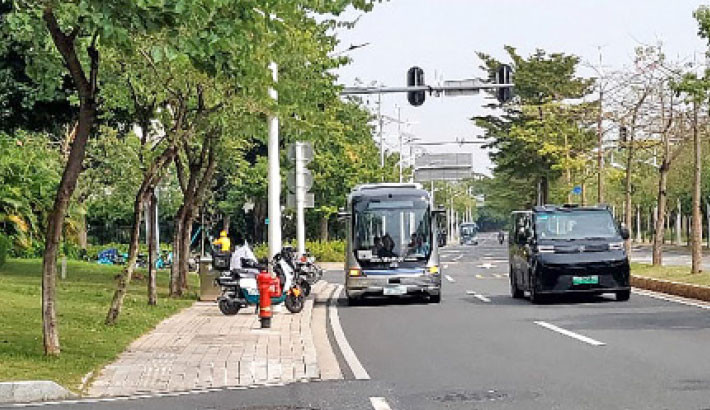Driverless buses bring smooth, super-easy urban mobility in Guangzhou
The minibuses have no driver, but if you haven’t tapped to pay, they’ll stop and remind you. It’s super easy -Zou Leijie, Guangzhou Resident
ANM Mohibub Uz Zaman, back from Guangzhou
Published: 10 Nov 2025

Autonomous vehicle services have revolutionised public transport in Guangzhou, making urban mobility smoother and more convenient than ever before.
Driverless minibuses are attracting crowds of curious residents eager to witness the city’s cutting-edge technology in action.
During a recent visit to Guangzhou, this correspondent observed several autonomous buses operating seamlessly on the roads.
Driverless buses bring smooth, super-easy urban mobility in GuangzhouJust outside the Mulian Hotel on Guangzhou Bio Island, a driverless WeRide bus was seen waiting at a stop. As soon as its passengers arrived, the bus began its journey—smoothly overtaking a stationary vehicle and even passing a nearby taxi with precision.
While moving through the city, this correspondent also spotted a number of autonomous buses and self-driving street cleaners in operation.
Describing the convenience of the service, Guangzhou resident Zou Leijie said, “The minibuses have no driver, but if you haven’t tapped to pay, they’ll stop and remind you. It’s super easy.”
Several companies are advancing driverless bus technology in Guangzhou. WeRide operates fully autonomous taxis in designated zones, while Pony.ai runs demonstration lines for self-driving vehicles. Apollo Go offers driverless taxi services in Guangzhou Science City, and Ruqi Mobility has launched what it claims to be China’s first fully driverless commercial robotaxi service.
WeRide currently operates its robotaxis in the Huangpu District and the Guangzhou Development Zone. Pony.ai’s demonstration routes connect major city locations such as the city centre, Baiyun Airport, and South Railway Station. Apollo Go also provides driverless taxi operations in Guangzhou Science City.
Autonomous driving technology is being applied in many other areas, including self-driving taxis, autonomous street cleaners, food delivery drones, and driverless trucks.
In both Guangzhou and Shenzhen, autonomous road-sweeping robots can be seen cleaning streets and public spaces. These machines work three to five times faster than humans, capable of cleaning more than 8,000 square metres of walkway or road in just 40 minutes.
The robots can detect traffic lights, navigate around obstacles, and function efficiently even in rainy weather—proving to be valuable allies to the city’s sanitation workers.
Several companies are developing driverless bus services in Guangzhou, including WeRide, which operates fully driverless taxis in designated zones, and Pony.ai, which has demonstration lines for autonomous driving.
Apollo Go also operates in the Guangzhou Science City, while another company, Ruqi Mobility, has launched what it claims is the first fully driverless commercial robotaxi service in China.
WeRide operates fully driverless robotaxis in designated zones within the Huangpu District and Guangzhou Development Zone.
Pony.ai has a demonstration operation line allowing users to ride in autonomous vehicles between different locations, such as the city centre, Baiyun Airport, and South Railway Station.
Apollo Go also operates driverless taxis in the Guangzhou Science City.
The technology of autonomous driving is also being used in a number of various circumstances, such as self-driving taxis, autonomous street cleaners, drones that deliver food, and driverless trucks.
Some autonomous road-sweeping robots were seen cleaning the street and other areas in the cities of Guangzhou and Shenzhen. The machine is three to five times faster than a human, and it can clean more than 8,000 square metres of walkways or roads in just 40 minutes.
These robots can also detect traffic lights, navigate obstacles, and operate in rainy weather, making them a valuable addition to sanitation workers.

